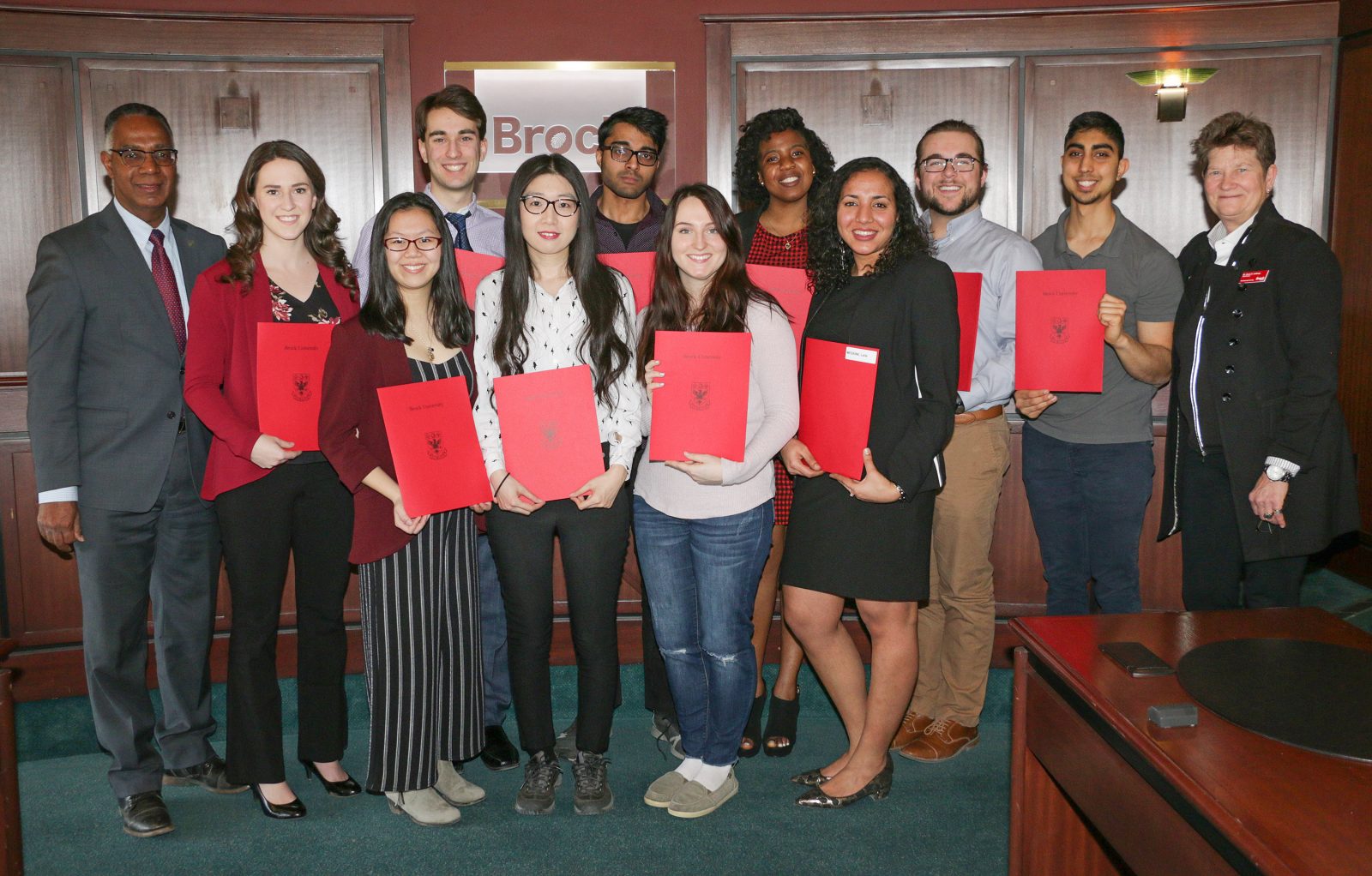The Department of Geography and Tourism Studies is pleased to congratulate Geography MA alumna, Katelyn Pierce (’20), who was recently awarded the 2020 Faculty of Social Sciences Best Graduate MA Thesis Award for her thesis titled “Detached from Our Bodies: Representing Women‘s Mental Health and Well-being with Graphic Memoirs.” Congratulations also to Katelyn’s MA supervisor, Dr. Ebru Ustandag.
Articles tagged with: awards
-
Social Sciences event to showcase faculty, student research

Michael Pisaric (left), Professor of Geography and Tourism Studies, is pictured during a trip to Sunset Beach in St. Catharines to measure the quantity of plastics turning up in the sand. Pisaric is one of three faculty members who will speak about their work at the Social Sciences Research Colloquium on Wednesday, Dec. 9.
From lake bottom sediment to digital data, from hockey to health care, and from local actions to global implications, there’s no shortage of impactful research being done in Brock University’s Faculty of Social Sciences (FOSS).
The University community is invited to hear about some of the compelling projects underway by faculty and students during the upcoming Social Sciences Research Colloquium taking place online Wednesday, Dec. 9 from 1 to 4 p.m.
This annual event recognizes the outstanding achievements of FOSS researchers and gives award recipients an opportunity to present their findings to the Brock community and wider public.
This year’s virtual colloquium will feature recent recipients of FOSS faculty awards that recognize consistent records of outstanding research achievements as reflected in the quality and quantity of refereed publications, grants awards and other research activities.
Featured recipients include Michael Pisaric, Professor of Geography and Tourism Studies, who received the 2019 Distinguished Researcher award; Assistant Professor Karen Louise Smith from the Department of Communication, Popular Culture and Film, who received the 2019 Untenured Researcher of the Year award; and Nicole Goodman, now Associate Professor of Political Science, who received the Untenured Researcher of the Year award in 2018, but was unavailable to present until this year.
In addition to faculty members, three winners of the Social Sciences Student Research Award were selected to present, including Pulkit Garg, who is pursuing a Master of Sustainability supervised by Professor of Biology Liette Vasseur; Jessica Falk, a Master of Arts candidate in Social Justice and Equity Studies, who is supervised by Margot Francis, Associate Professor of Women’s and Gender Studies; and Master of Arts candidate in Critical Sociology Appiah Bonsu, who is supervised by Associate Professor of Sociology Trent Newmeyer.
This is the second Research Colloquium to showcase FOSS student researchers alongside faculty award winners. Combined, faculty and student presentations represent six FOSS departments.
Winners of the 2020 FOSS faculty awards will be announced at the Research Colloquium, providing a preview of next year’s event.
All are welcome to attend the free online event. For more information, including the draft agenda and login instructions, please visit the Research Colloquium website.
What: Social Sciences Research Colloquium
When: Wednesday, Dec. 9, 2020 from 1 to 4 p.m.
Where: Lifesize
Who: This webinar is free and open to the public.STORY FROM THE BROCK NEWS
awards, event, Faculty of Social Sciences, FOSS, Michael Pisaric, Research Colloquium
Categories: News -
Geography and Tourism Studies Adjunct Professor named to the Order of Canada
FROM THE BROCK NEWS | TUESDAY, DECEMBER 01, 2020 | by Maryanne St. Denis
A man well known to the Brock University community — and to the world for his critical climate change work — has received one of the country’s highest honours.
Brock alumnus David Grimes (BSc ’75) was named to the Order of Canada on Friday, Nov. 27. He was recognized for his outstanding leadership in meteorology and for his pioneering development of a global strategy on climate change and disaster-risk preparedness.
Grimes was the first Canadian to serve as President of the World Meteorological Organization (WMO), a United Nations agency that co-ordinates international efforts to better understand the planet’s pressing weather, water and climate issues. He served two terms in the lead role from 2011 to 2019.
He was among 114 appointments to the Order of Canada announced by Governor-General Julie Payette last week. Also receiving the honour was John Peller, a leader in Canada’s wine industry and a long-time supporter of Brock University.
The Order of Canada recognizes Canadians whose service shapes society, whose innovations ignite imaginations and whose compassion unites communities.
During his time at Brock, Grimes studied mathematics, and nuclear and quantum physics, ultimately graduating with a Bachelor of Science in Physics.
Upon graduation, he joined Environment Canada, where he trained as a meteorologist and spent more than four decades fulfilling policy and management assignments. He also served as Assistant Deputy Minister and head of Environment Canada’s Meteorological Service from 2006 to 2019.
Grimes was previously honoured by Brock, receiving the University’s Alumni of Distinction Award in 2012 and the Faculty of Mathematics and Science Distinguished Graduate Award in 2016.
“I am very pleased to hear that David Grimes has been named to the Order of Canada,” said Ejaz Ahmed, Dean of Brock’s Faculty of Mathematics and Science. “It is a well-deserved honour.”
“We are very proud of David’s unparalleled contributions to science and society.”
Recipients of the Order of Canada will be invited to accept their awards at a ceremony to be held at a later date.
STORY FROM THE BROCK NEWS
Adjunct Faculty, awards, David Grimes
Categories: News -
Brock researcher awarded Fulbright Canada Research Chair
Kevin Turner, Associate Professor in the Department of Geography and Tourism Studies, has been awarded a Fulbright Canada Research Chair in Arctic Studies at the University of Washington.
Next winter, Turner — who is also cross-appointed to the Department of Earth Sciences, an Associate Member of the Department of Biology and a Co-Founder of the Water and Environment Lab at Brock — is set to spend six months teaching and researching the impacts of climate change on northern landscapes, lakes, rivers and wetlands.
“As land and water adjust to changes in climate, we are presented with many questions of urgent global concern, particularly to northern stakeholders,” says Turner. “Changing landscape components, such as permafrost thaw, will influence global carbon cycles and climate-warming greenhouse gases. This is a far-reaching concern.”

The Fulbright Canada Research Chair in Arctic Studies recognizes Associate Professor Kevin Turner’s ongoing work in mapping Arctic lake and river responses to landscape disturbances caused by the changing climate, as shown in this photo he captured of a landslide due to thawing permafrost.
Turner notes that there are also local concerns, including how landscape disturbance such as fire, landslides and lake drainage can affect water quality, ecology, infrastructure and travel. To address some of these issues, he will use the research component of the Chair position to “take inventory of the landscape changes and identify how they influence the hydrology and chemistry of lakes, rivers and wetlands.”
“The research aims to enhance our knowledge of climate change impacts and feedbacks,” says Turner, who has been conducting fieldwork in northern Yukon for 14 years. “We do this by identifying linkages among landscape changes and lake and river biogeochemistry across the ecologically and culturally important landscapes of the Yukon River Basin.”
The Fulbright Canada Research Chair also involves teaching for the University of Washington’s minor in Arctic Studies. Turner plans to share with students both remote sensing and field-based techniques for collecting landscape data, as well as teaching students how to analyze, synthesize and share their findings with broad audiences.
Turner says he was honoured to be selected for the Fulbright Canada Research Chair.
“There are several colleagues I look up to who have received it in the past,” he says. “I am grateful that I have this opportunity to extend my research program and collaborations across borders.”
Turner is attracted to the University of Washington for several reasons, not the least of which is the chance to work more closely with colleagues whom he has met during his affiliation with the National Aeronautics and Space Administration’s (NASA) Arctic-Boreal Monitoring Experiment.
He also notes that the Henry M. Jackson School of International Studies, where the position will be homed, is a “leader in advancing the understanding of and engagement in world issues.”
“Several researchers and dignitaries from Yukon participate at their various forums, including Dana Tizya-Tramm, Chief of the Vuntut Gwitchin First Nation (VGFN; Old Crow, Yukon), who discussed impacts of climate change on Indigenous communities and their resilience during a meeting of the World Affairs Council,” says Turner. “The priorities of my research program have been guided by the vast knowledge that the VGFN have of their traditional territory and the observations they have made over generations.”
Turner also has personal reasons to be excited about relocating to Seattle for the duration of the position.
“As a past varsity rower, I’m interested in seeing where that 1936 crew came from on their way to gold in Germany,” Turner admits. “I should also mention that I’m a big fan of several musical artists who came from Seattle — top of the list would be Jimi Hendrix.”
However, the ongoing COVID-19 pandemic may interfere with Turner’s plans. The position is set to begin in January 2021, but a few pieces need to fall into place before then.
“We are currently living in a world of virtual-communications and we are unsure of how this will change by the end of the year,” says Turner, adding that international visas were suspended by the U.S. Department of State until the end of 2020. “Fulbright is currently looking into these issues and will provide updates as they learn more. I have hope that things will change for the better as the new year approaches.”
Turner also points out that “climate change will not pause for us, and there is a lot within that realm that we need to learn.”
“Arctic and subarctic regions are undergoing climate warming at a rate twice above the global average, and changes in precipitation patterns occurring — less snow and more rain, for example — are having major impacts on these landscapes,” says Turner. “The processes that cause permafrost degradation are often triggered by warm and wet conditions, and since about a third of the world’s carbon is locked in permafrost, this has complex ramifications for the rest of the world.”
STORY FROM THE BROCK NEWS
awards, funding, geography, Kevin Turner, Physical Geography, research
Categories: News -
Brock researcher receives national award for work on water governance
Julia Baird is the recipient of the 2020 Water’s Next Award in the category of “People: Academic Leader.” The award was announced in June at the annual Canadian Water Summit, which was held virtually earlier this month.
Baird, Assistant Professor in the Environmental Sustainability Research Centre (ESRC) and the Department of Geography and Tourism Studies, is a Tier II Canada Research Chair in Human Dimensions of Water Resources and Water Resilience. She was also nominated for the award in 2019.
Baird, who runs the Water Resilience Lab out of ESRC, was grateful for the honour.
“I especially appreciate this award because the Canadian Water Summit is a gathering place for Canadians working on water issues — a diverse group including government, academics, non-government organizations and industry,” Baird says. “It signals to me that my work is relevant beyond academia, and that is really important to me as a sustainability scientist.”
Baird’s extensive research on the governance of water resources was recently in the spotlight during the virtual launch of a new partnership between World Wildlife Fund-Canada and the ESRC that will examine the ways in which flood planning is taking place around the St. John River Basin, located in New Brunswick, Québec and the American state of Maine.
“The research is exciting because it will make important contributions to scholarship on watershed-based governance and climate change adaptation planning, and it also has immediate relevance for those in the basin,” says Baird.
But, as Baird points out, the launch webinar also highlighted the pressing issue of a lack of co-ordination amongst stakeholders — an issue she believes requires urgent attention.
“Water governance and specific issues like flood planning are not usually highly co-ordinated across administrative boundaries, but water doesn’t respect our administrative boundaries,” Baird says. “There are benefits, including efficiency, innovation and greater effectiveness, if decision-making and direction-setting occur in co-ordination or collaboration with others in the watershed.”
Alongside her work on the St. John River Basin, Baird is engaged in another endeavour with colleagues from Brock to examine how and why people think about resilience when it comes to water resources.
Early findings have shown that it is possible to “predict the extent to which individuals align with a resilience perspective based on some key differences, including age, empathy, openness and optimism about the future.”
“This builds our understanding of how close — or far — those in society are to agreeing with and believing in the importance of governing using resilience principles, such as emphasizing broad participation in governance, supporting learning and experimentation, and recognizing the importance of connectivity,” says Baird, noting that although this work began as a single project, it is expanding into its own program of research.
“The argument is that we need a resilience perspective because it acknowledges how the world works — its complexity, its dynamic nature, and its uncertainty,” Baird explains. “When we view the world with this lens, new possibilities for how we govern it open up.”
Baird says that the work will soon move toward using the initial findings of the project to influence mindsets more broadly to encourage a resilience perspective.
“Shifting mindsets is one of the most powerful levers we have for change,” says Baird. “I think there’s a lot of potential for positive action as a result of this research.”
STORY FROM THE BROCK NEWS
awards, Julia Baird, research, Resilience, water
Categories: News -
Geography and Tourism Studies Chair receives Michael Plyley Graduate Student Mentorship Award
The Faculty of Graduate Studies (FGS) has named the five recipients of the annual FGS Awards, which were delivered the news in a virtual format for the first time in the awards’ nine-year history.
The awards, typically handed out at the Mapping the New Knowledges Graduate Student Conference in April, celebrate the accomplishments and excellence of members of Brock University’s graduate community.
“Despite not being able to recognize our winners in-person at this time, handing out these awards is still an important and meaningful celebration of the outstanding graduate culture that Brock has worked hard to grow,” says Diane Dupont, Interim Dean of Graduate Studies. “Our winners have all greatly contributed to making Brock an excellent place to pursue graduate education.”
Marilyn Rose Graduate Leadership Award
The Marilyn Rose Graduate Leadership Award, which recognizes a faculty, staff and students for their work and leadership in developing and/or enhancing graduate studies and the graduate student experience for students, was presented to Rachel Yufei Luan.
“To me, leadership is all about inspiring people,” says Luan, a second-year student in the master of Business Administration International Student Program. “It’s not only what you say you and do, but how you say and do it. People with good leadership skills can influence their community every day.”
Michael Plyley Graduate Mentorship Award
The Michael Plyley Graduate Student Mentorship Award normally awards two Faculty members for their outstanding mentorship of graduate students, one in the category or mentorship of only master’s students, and one in the category of mentorship of both master’s and PhD students. However, this year the adjudication committee was unanimous in their decision to name four award winners.
Michael Pisaric, Professor in the Department of Geography and Tourism Studies, and Karen Fricker, Associate Professor in the Department of Dramatic Arts, were awarded the Mentorship Award in the master’s only category.
Pisaric says receiving the award was “easily one of the highlights of my career.”
“When my students approached me about the nomination, I was touched that they thought of me in such regard as to nominate me. To actually receive the award, however, is humbling. Graduate students are at the heart of my research program. Without my amazing students, my research program would not be nearly as successful. We are creating the scientists and leaders of tomorrow ,and my goal is to ensure they are well prepared for whatever path they follow when they leave Brock.”
Pisaric says one of the most important aspects of being a mentor to his students is cultivating a thoughtful and supportive experience for his students in the same way he received while he was a student.
The award is equally as meaningful to Fricker, whose advice to other mentoring graduate students is to “seek out opportunities and giver ‘er. Such mentorship is one of the deepest rewards of academic life.”
As there are currently no graduate programs in Dramatic Arts, the opportunity for Fricker to supervise graduate students is small. Working with her current student in the master of Arts in Popular Culture has been educational and helped her stay on her own theoretical and critical game.
In the category of master’s and PhD students, the recipients of the awards were Madelyn Law and Miriam Richards.
Law, Associate Vice-Provost, Teaching and Learning and Associate Professor in the Faculty of Applied Health Sciences, was touched that her students thought highly enough of their experiences with her to nominate her for the award.
“I don’t do things to win awards — I just always focus on improving the way I work with students based on listening and understanding their research and educational goals,” says Law. “Receiving this award has allowed me to see that this approach is appreciated and making a difference for these students lives, which is all I could ask for.”
Richards, a Professor of Biological Sciences, said the award was a great boost during an uncertain time. She also comments that being a good mentor is as beneficial for her, as for her students.
“Research and academia are challenging, fascinating and sometimes very difficult,” says Richards. “Research is a team activity and for science students, is basically an apprenticeship. It’s not really something you can do by yourself. Supervising grad students is one of the best things about my job.”
When asked to provide advice and insight to others on effectively mentoring students, all winners felt similar in that there was no perfect recipe, but touted open communication, understanding and kindness.
The full list of this year’s FGS Awards recipients are below.
Marilyn Rose Graduate Leadership Award
Rachel Yufei Luan
Michael Plyley Graduate Mentorship Award
Karen Fricker
Michael Pisaric (Geography and Tourism Studies)
Madelyn Law
Miriam RichardsJack M. Miller Excellence in Research Awards (at least one recipient from each Faculty)
Faculty of Applied Health Sciences
Talia Ritondo, MA, Applied Health Sciences
Nigel Kurgan, PhD, Applied Health SciencesFaculty of Education
Monica Louie, MEd, Education
Susan Docherty-Skippen, PhD, EducationGoodman School of Business
Ardalan Eyni, MSc, Management
Faculty of Humanities
Simone Mollard, MA, Classics
Brett Robinson, PhD, Interdisciplinary HumanitiesFaculty of Mathematics and Science
Scott Cocker, MSc, Earth Science
Parisa Abbasi, PhD, ChemistryFaculty of Social Sciences
Madeline Asaro, MA, Applied Disability Studies
Megan Earle, PhD, PsychologySTORY FROM THE BROCK NEWS
awards, graduate studies, Michael Pisaric
Categories: News -
Star of The Alan Nursall Experience shares Brock experience
FROM THE BROCK NEWS | WEDNESDAY, DECEMBER 18, 2019 | by Amanda Bishop

Alan Nursall received the 2019 Distinguished Graduate Award for the Faculty of Social Sciences earlier this year.
When Alan Nursall returned to Brock University 40 years after graduating to receive the 2019 Distinguished Graduate Award for the Faculty of Social Sciences, campus wasn’t quite the same as it was when he’d left.
“Brock in 2019 is a completely different place, and I mean that in a good way,” says Nursall (BA ’79). “The campus has grown so much and seems so much more imposing than it did in the 70s. But that’s a good thing — its growth is a sign of its success.”
Even with all of the changes, Nursall’s feeling when he comes to Brock is always the same. “Every time I return, up to and including this year, I get a warm feeling recalling the friends and fun from those four years.”
Since Nursall completed his Geography studies at Brock, he has become a widely known science educator, with a face easily recognizable from his popular segment, The Alan Nursall Experience, on the Discovery Channel’s Daily Planet.
He joined the staff of Science North when it opened in 1984 and worked as the science director for its companion facility, Dynamic Earth, from 1999 to 2007.
He then went on to open NEXT Exhibits + Creative Communication, a firm specializing in creating exhibits and experiences for museums and science centres, working with the likes of the Smithsonian Institution and the Canadian Space Agency to make science accessible, engaging and fun.
In 2014, Nursall was appointed President and CEO of TELUS World of Science – Edmonton, a science centre operated by the Edmonton Space & Science Foundation, where he continues his work blending learning with entertainment.
“I ended up spending 35 years working science centres, an incredibly satisfying career that I never dreamed of in school,” says Nursall. “But my post-secondary education sure made it possible.”
Though he is back in Edmonton now, Nursall was a long way from his Alberta home when he came to Brock in 1975. With a few good friends and a program that excited and challenged him, he found his footing by the end of his first year.
“I still remember the first time someone called me Cowboy because I was from Alberta,” says Nursall. “I was born and raised in suburban Edmonton, but the nickname stuck, and for most of my four years at Brock, I was called Cowboy by pretty much everybody.”
Nursall says the nickname still makes him smile, and still comes to mind from time to time, as it did a few years ago when he had the opportunity to take a zero-G flight, flying 15 parabolas and thus having 15 weightless episodes.
“As part of the flight, you were asked to adopt a nickname,” Nursall says. “I requested the nickname Cowboy, and that name tag from the zero-G flight now sits prominently in my den, a reminder of the flight, but also of my time at Brock.”
Nursall credits his fourth year in the Geography program as having the strongest impact on his trajectory as a science educator. He notes three key factors: his great professors, some challenging research projects and the fact that his was the first class to be assigned a weekly internship.
“My internship was at the Atmospheric Environment Service headquarters in Toronto, where I took on a project under the guidance of climatologist Dave Phillips, the originator of the weather trivia calendar and now famous across the country as the Senior Climatologist for Environment Canada,” says Nursall. “Working with Dave, I undertook a research project that turned into a summer job and then turned into a graduate degree.”
“The internship program really shaped my life, creating connections and opportunity that I never would have imagined possible. I have deep respect and affection for the professors in the Geography department who were always looking for ways to expand our horizons beyond the textbooks and classrooms.”

Alun Hughes (left) and Alan Nursall face off on the soccer pitch in 1978 on the right.
When Nursall attended Fall Homecoming to receive his award, he received another gift as well — a copy of History Made in Niagara, the book of Professor Alun Hughes’ writings published posthumously last spring. Nursall says the gift was a highlight of his visit.
“Alun was a good friend and mentor,” says Nursall, who still has a photo of the two men playing in a student-faculty soccer game around the fall of 1978.
Nursall emphasizes that he didn’t know what career he would pursue while he was at Brock, but instead he sought out opportunities that challenged and interested him. He would encourage students to embrace their experiences here.
“Your education doesn’t prescribe your career — it prepares you for it, and for life in general,” Nursall says. “Your education doesn’t fill your brain with information, it helps you become a better thinker. And that is what drives success. That is what expands your world.”
alumni, Alun Hughes, awards, Faculty of Social Sciences
Categories: News -
Julia Baird selected as finalist for Water’s Next award
 The Department of Geography and Tourism Studies would like to congratulate Dr. Julia Baird for being selected as a finalist for a 2019 Water’s Next award. This “awards program honours the incredible achievements and ideas of individuals and companies that successfully work to make a positive change to water in our country and abroad”. Dr. Baird was selected as a finalist in the People – Academic category.
The Department of Geography and Tourism Studies would like to congratulate Dr. Julia Baird for being selected as a finalist for a 2019 Water’s Next award. This “awards program honours the incredible achievements and ideas of individuals and companies that successfully work to make a positive change to water in our country and abroad”. Dr. Baird was selected as a finalist in the People – Academic category.awards, Julia Baird, water
Categories: News -
Geography graduate student wins best paper award
The Department of Geography and Tourism Studies would like to congratulate our Master of Arts in Geography student, Aaron Nartey, on receiving a Faculty of Social Sciences Student Research Award for his proposed Major Research Paper project titled “Return Migration of Ghanaian Immigrants”.
awards, geography, graduate studies, Human Geography, MA Geography
Categories: News -
Tourism student receives 2019 President’s Surgite Award

Brock President Gervan Fearon (left) and Anna Lathrop, Vice-Provost, Teaching, Learning and Student Success (right), present the President’s Surgite Awards to Olivia Poulin, Meghan Hickey, Nicolas Sardella, Wei Wang, Fayyaz Rizvi, Taylor Lidster, Daislyn Vidal, Leila Meskine, Jonah Graham and Dhruv Jivan.
Some of the brightest young minds at Brock University were recognized Tuesday for their displays of leadership and contributions to both the Brock and wider Niagara community.
Ten Brock students were selected from across the University to receive the President’s Surgite Awards, which honour the hard work they’ve completed throughout their educational journey.
The cross-section of students have amassed impressive resumés packed with academic accomplishments, volunteer experience and community contributions — making them fitting recipients for one of the University’s most prestigious honours.
The awards were presented by Brock President Gervan Fearon and Anna Lathrop, Vice-Provost, Teaching, Learning and Student Success, during a luncheon to celebrate the recipients on Tuesday, April 2.
After spending time learning from each award winner about their areas of focus and highlights of their Brock experience, Fearon encouraged them to reflect on their scope of leadership.
“What happens is we often look at ourselves as individuals and don’t realize we’re impacting and influencing so many of the people around us,” he said. “All of those influences represent your scope of leadership, which is often broader than your job and touches on your volunteer work and the example you’ve become within the community.
“You’re all leaders and examples to your peers, who then aspire to be able to achieve the same level of excellence. When you multiply that out to the wider scope, you become an inspiration to humanity because you’re defining possibilities.”
Fourth-year Medical Sciences student Dhruv Jivan was humbled by the honour and said he is grateful to have had such a rich university experience.
“Brock is such a loving and connected community. That environment allows you to thrive,” he said. “I wouldn’t trade this experience for the world.”
Through the University, Jivan spends time volunteering at the Brock Centre for Health and Well-Being, which has helped to shape his future path.
“I’ve grown so much during my time with the centre,” he said. “My love for the geriatric community and my passion for working with them has grown exponentially since I’ve been there.”
Lathrop told the students she’s confident the “future’s in good hands” with them at the helm. “Thank you for being at Brock and for making big differences in the world as you move forward in life,” she said.
The 2018-19 President’s Surgite Award winners include:
- Olivia Poulin (Business Administration — Marketing)
- Jonah Graham (Tourism and Environment, Minor in Geography)
- Dhruv Jivan (Medical Sciences)
- Meghan Hickey (Medical Sciences)
- Fayyaz Rizvi (Biological Sciences)
- Nicolas Sardella (Biotechnology, Co-op Option)
- Daislyn Vidal (Biological Sciences)
- Wei Wang (Business Administration)
- Leila Meskine (Mathematics and Statistics)
- Taylor Lidster (Biological Sciences)
Story reposted from The Brock News.
awards, leadership, student, tourism, Tourism and Environment
Categories: News
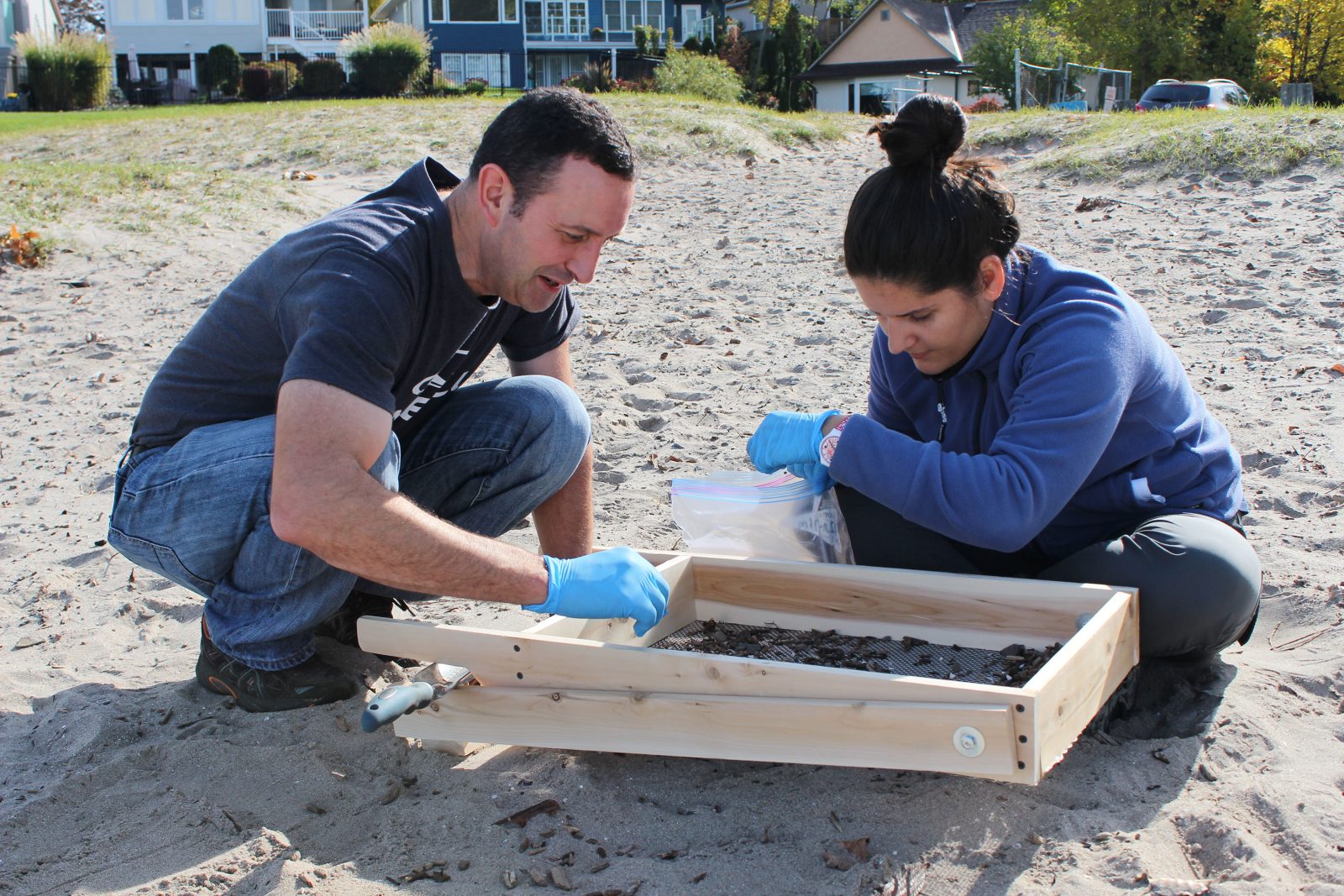
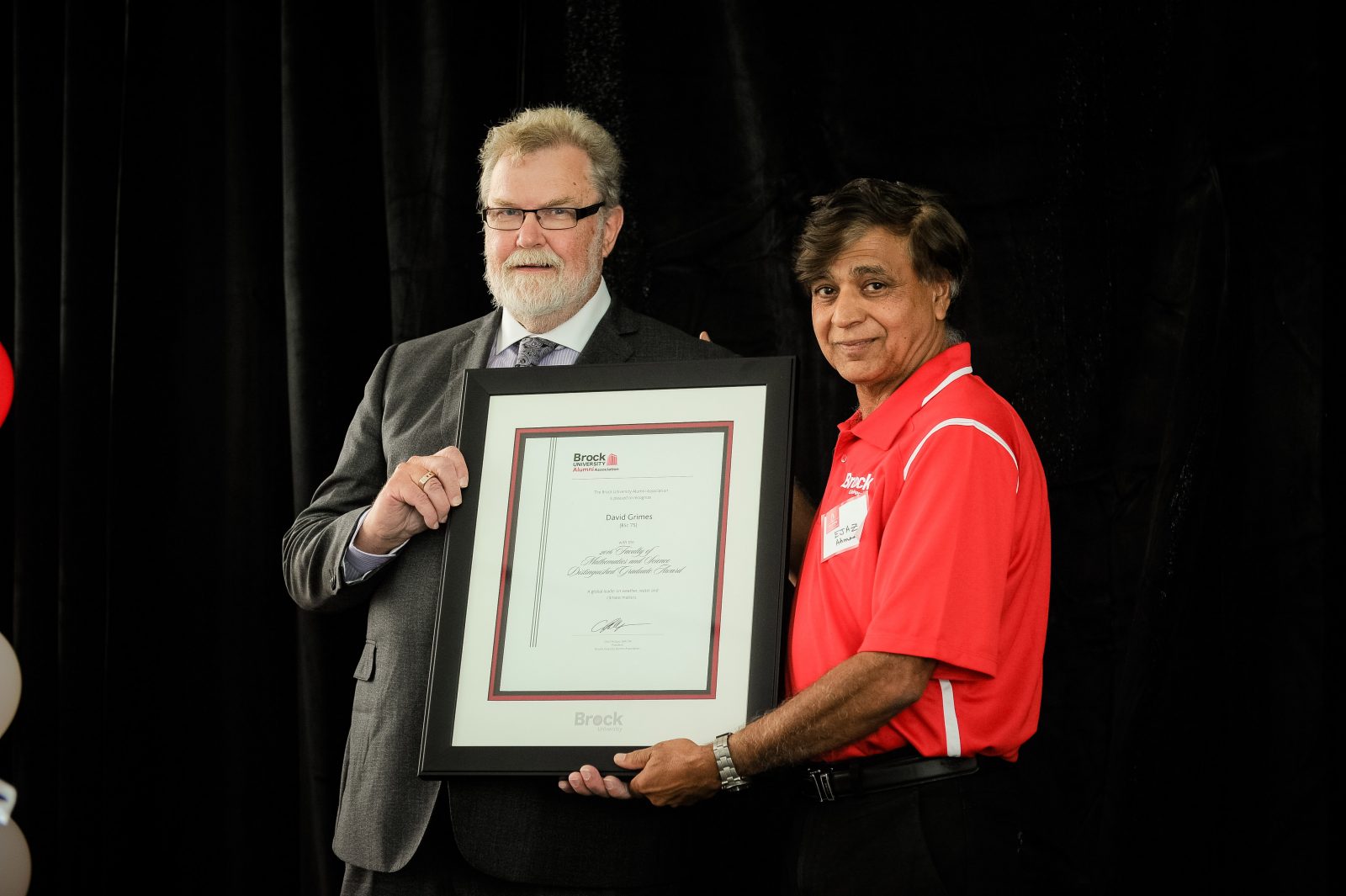
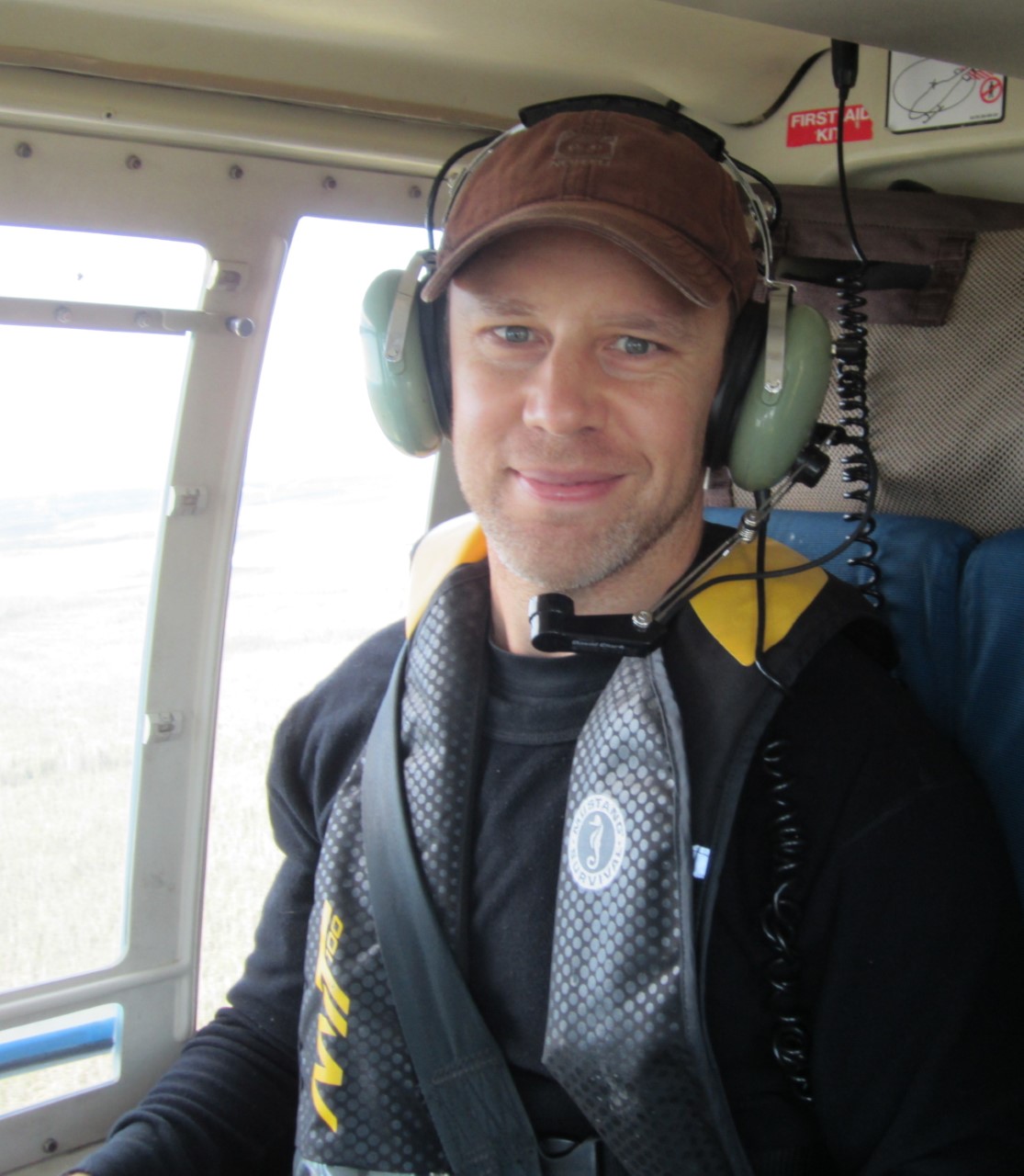
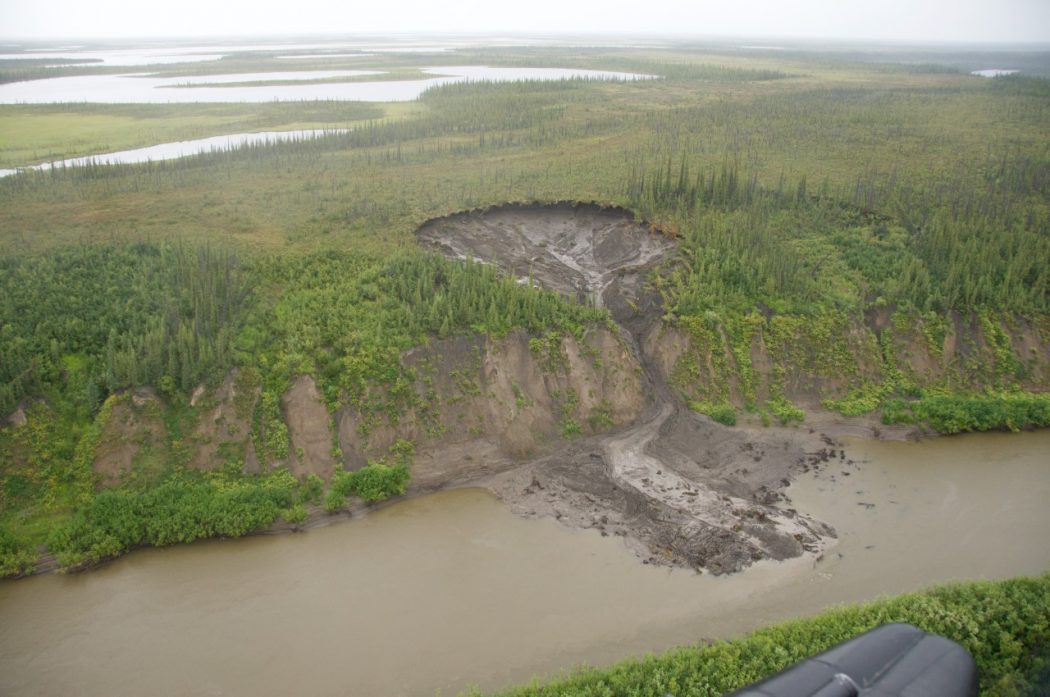
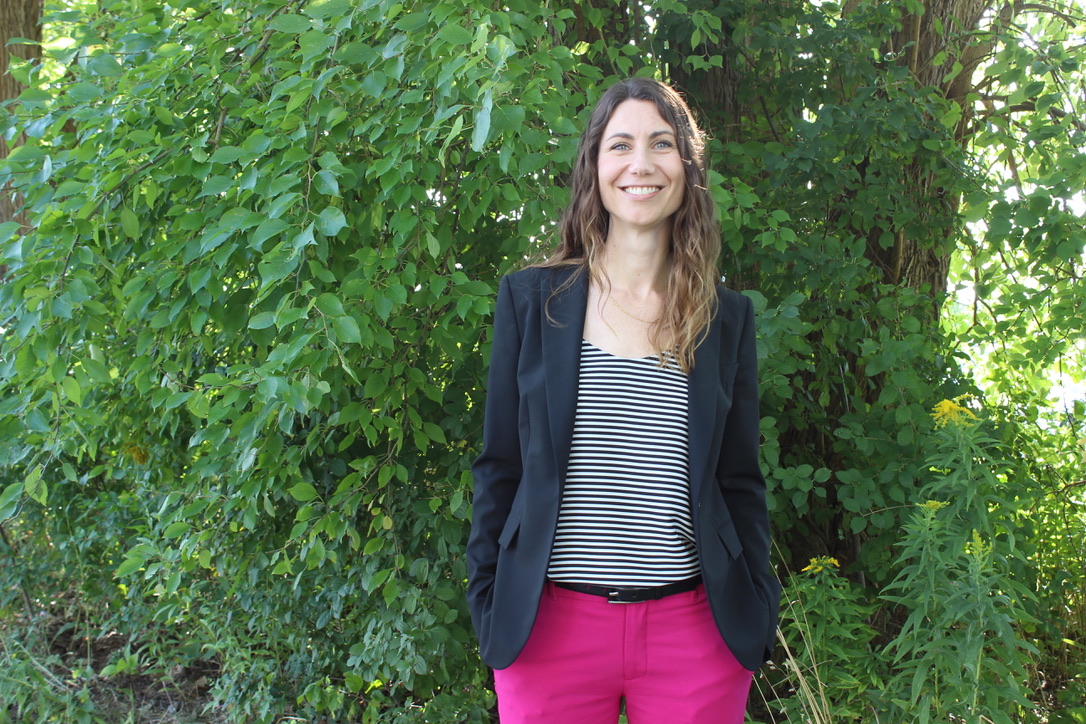


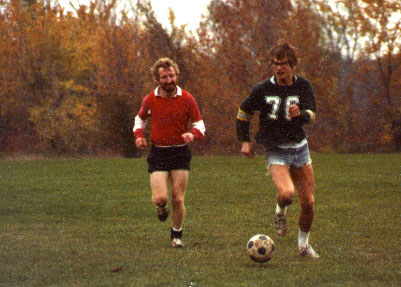
 The Department of Geography and Tourism Studies would like to congratulate Dr. Julia Baird for being selected as a finalist for a 2019 Water’s Next award. This “awards program honours the incredible achievements and ideas of individuals and companies that successfully work to make a positive change to water in our country and abroad”. Dr. Baird was selected as a finalist in the People – Academic category.
The Department of Geography and Tourism Studies would like to congratulate Dr. Julia Baird for being selected as a finalist for a 2019 Water’s Next award. This “awards program honours the incredible achievements and ideas of individuals and companies that successfully work to make a positive change to water in our country and abroad”. Dr. Baird was selected as a finalist in the People – Academic category.